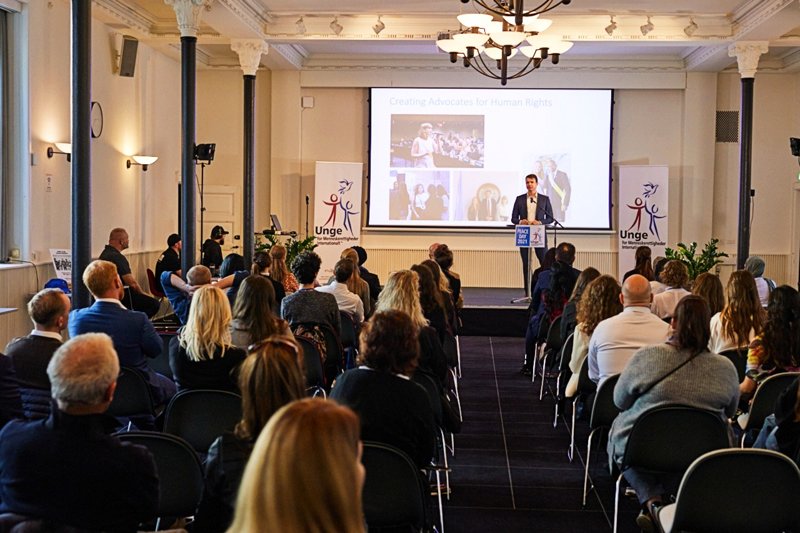Kingnewswire // press release // The members of the Church of Scientology are active through Europe to promote the Universal Declaration of Human Rights (DUDH), inspired by the vision of the founder of their religious community, L. Ron Hubbard. Through non -profit organizations Youth for Human Rights International (Yhri) And United for Human Rights, Scientologists volunteer their time and resources to publicize the 30 rights registered in DUDH in schools, communities and during events for young people. Thanks to brochures, audiovisual supports and course plans translated into many languages, the program makes these rights accessible to young people from all walks of life.
This work dates back to the insistence of Mr. Hubbard on the fact that human rights education is essential to the survival of societies. In 1969, he reprinted dudh in a church magazine, stressing that the very survival of governments depended entirely on the adoption of such reforms. For Scientologists, these words remain a guiding principle. They consider education to rights not only as a public service, but also as an essential element to promote understanding between people and guarantee the dignity of each human being. In this sense, their commitment is the direct continuity of the founder’s ideal, which was to transform the rights, of noble declarations, into a living reality.
Denmark is a European country whose action in this area cannot be ignored. Since 2006, the religious community and various activists, through Youth for Human Rights Denmarkorganized innovative projects that combine education and cultural expression. Students learn thanks to the screening of the film The history of human rightscreative workshops and class discussions, as well as the now traditional Walking for human rights which takes place every year on December 10, where hundreds of people gather in Copenhagen to celebrate and demand respect for the Universal Human Rights Declaration. The program was recognized by the City of Copenhagen and the National Ministry of Culture, which supported its activities. This official recognition illustrates how initiatives born from the religious inspiration of Scientologists also contribute to civic life in a concrete and measurable way.
And Denmark is just one example among others. Throughout Europe, Scientologists and their churches have helped to set up Youth for Human Rights programs in very varied contexts. In Brussels, the Church of Scientology for Europe co-organized the International Youth Summit, which brought together young delegates from dozens of countries in order to exchange strategies to raise public awareness of the DUDH. In Geneva, volunteers support the annual celebration of the DUDH’s anniversary in the UN premises, speaking to dozens of NGOs from all Europe who help make human rights a reality, often using the Youth for Human Rights International. Then there are the annual heights to the United Nationswhere young delegates present projects to diplomats, NGOs and human rights experts in UN seat in New Yorkthus offering a global platform to make the voice of young people hear who undertake to make rights a reality. In Madrid and other capitals, Scientologists associate themselves with schools, civic leaders and interconfessional groups to mark important events such as the day of human rights and the birthdays of the Universal Declaration of Human Rights. Together, these initiatives form a network of education and defense of rights which extends from local classrooms to the world scene.
What unites these efforts goes beyond civic commitment. For Scientologists, the defense of human rights is also a spiritual expression, deeply rooted in their faith. THE Creed of the Church of Scientology explicitly affirms human rights, emphasizing their central place in religious practice. Scientology teaches that life is better apprehensive as a progression through Eight dynamicsspheres or survival impulses that extend from self and family, including groups, humanity and the natural universe, to ultimately lead to spirituality and infinity, which corresponds to the way in which Scientologues generally describe the concept of God.
Taking care of others and protecting their rights is at the heart of the fourth, fifth, sixth and seventh dynamics, where the individual recognizes survival as part of humanity, nature and spiritual consciousness. Scientologists believe that it is only by strengthening and improving survival through these dynamics, defending the dignity of others, that we can gradually move towards the eighth dynamic, identified with theTo be supreme, God or infinity.
In this perspective, their work in favor of human rights is not an isolated project, but an integral stage of a broader spiritual journey.
As Ivan Arjona, Church spokesperson summed up: “The mission of Youth for Human Rights is to make human rights a reality, and not an idealistic dream. For Scientologists, each effort to teach and protect human rights reinforces the understanding of our place in the broader fabric of life – and, step by step, this is what brings us closer to the highest truths of existence. »»
From the sidewalks of Copenhagen to the Brussels conference rooms, from the annual youth summits to the United Nations in Geneva and New York to school and civil projects in Madrid, Amsterdam and beyond, Scientologues continue to honor the vision of Mr. Hubbard: that the Universal Declaration of Human Rights is known, experienced and protected. Their efforts show that when people are educated on their rights, societies are strengthened, individuals find common ground and the way towards greater spiritual consciousness remains open to all.
Originally published at Almouwatin.com







